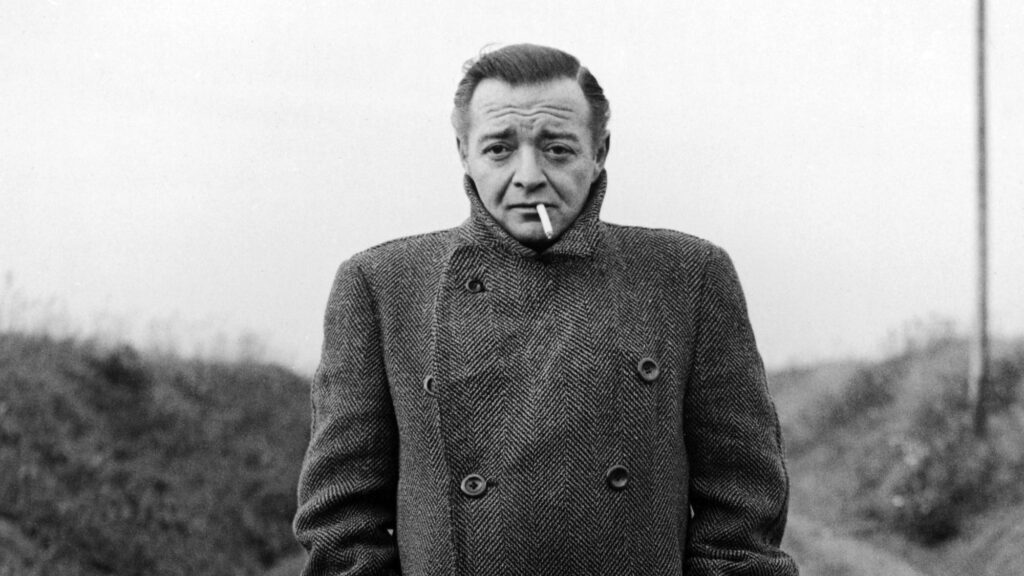PETER LORRE: STRANGER IN A STRANGE LAND

Curated by Alexander Horwath
His voice summons angels and demons, his body and face are those of a child heavy with guilt. Charlie Chaplin referred to him as “the greatest living actor”, and for his friend Bertolt Brecht he was simply the ideal performer. But Peter Lorre (1904-1964) is also The Lost Man. He chose that title for his only directorial work, and most writers apply it to his whole career. He’s an errant star in the galaxy of movie icons: luring us away from its false promises into a world of unease, he gave us a supremely honest representation of 20th-century man. His on-and-off-screen persona is the fractured result of traversing through European modernism and fascism, addiction and exile, the culture of money and fame, the mirror cabinet of faces and masks. The subject matter of his best films and the shape of his strongest performances can be found on this map.
“Haunted by his early success in Fritz Lang’s M and by lifelong illness, Hollywood stereotyping, McCarthyism and the indifference of West German society after the war, Lorre never achieved his full potential” – such brief summaries, while not incorrect, tend to miss most of what this programme tries to evoke. Except for Lorre’s overtly ‘expressionist’ work in The Beast with Five Fingers, it doesn’t focus on the cloaks of horror and exoticism that were draped around him by studio casting and PR, nor on his much-beloved roles as Humphrey Bogart’s faithful companion at Warner Bros. Instead, we hope to illustrate the depths of sadness and the comedic heights that Lorre could reach in more substantial parts – no matter if they came his way via master directors (a foreign spy for Hitchcock; Rodion Raskolnikov for Sternberg) or via less lofty names such as Granowsky, Ratoff, Florey or Lloyd.
The Face Behind the Mask, a stroke of genius as a film and as a Lorre title, evokes central traits of the actor’s work: fatalism, anguish, the dubious morals of bourgeois society, the multiple shades of homelessness in his emigré character. We may superimpose this “Face” on that of Kaspar Hauser – Lorre’s lifelong dream project which never came to pass – and view him as a foundling: László Löwenstein, born on the fringes of an empire, in a town named after the wild roses growing in the area. Aged 19, he was baptised Peter Lorre by the founder of psychodrama, Jacob Levy Moreno, whose improvisational theatre he had joined in Vienna. Forty years later, his career would end with a film called The Patsy. Today, he is best described in an existential manner: “Lorre is the one who speaks up in each of us and makes us aware that we have been torn out of every context, debased,” said Elfriede Jelinek. But we may also take the foundling at his own word as he fiendishly accepts Erich von Stroheim’s admonition: “Without me you would be lost in this sophisticated world full of shrewd men and clever women.” Lorre: “Yes, I’m just a babe in the wood.”
Alexander Horwath
Program
Wednesday 22/06/2022
21:45
Piazza Maggiore
M
M
Ehsan Khoshbakht
Saturday 25/06/2022
14:00
Arlecchino Cinema
THE FACE BEHIND THE MASK
THE FACE BEHIND THE MASK
Sunday 26/06/2022
09:00
Arlecchino Cinema
THE BEAST WITH FIVE FINGERS
THE BEAST WITH FIVE FINGERS
Sunday 26/06/2022
14:00
Arlecchino Cinema
DER VERLORENE
DER VERLORENE
Alexander Horwath
Monday 27/06/2022
09:00
Arlecchino Cinema
Three strangers
Three strangers
Official screening on Friday 1 July at 14:00
Monday 27/06/2022
14:00
Arlecchino Cinema
The Trunks of Mr. O.F.
The Trunks of Mr. O.F.
Tuesday 28/06/2022
14:00
Arlecchino Cinema
THE MAN WHO KNEW TOO MUCH/Man from the South
THE MAN WHO KNEW TOO MUCH/Man from the South
Wednesday 29/06/2022
09:15
Arlecchino Cinema
DIE KOFFER DES HERRN O.F.
DIE KOFFER DES HERRN O.F.
Wednesday 29/06/2022
14:00
Arlecchino Cinema
CRIME AND PUNISHMENT
CRIME AND PUNISHMENT
Thursday 30/06/2022
09:00
Arlecchino Cinema
CRIME AND PUNISHMENT
CRIME AND PUNISHMENT
Donald Sosin
Thursday 30/06/2022
14:00
Arlecchino Cinema
I WAS AN ADVENTURESS
I WAS AN ADVENTURESS
Friday 01/07/2022
09:00
Arlecchino Cinema
I WAS AN ADVENTURESS
I WAS AN ADVENTURESS
Friday 01/07/2022
14:00
Arlecchino Cinema
THREE STRANGERS
THREE STRANGERS
Saturday 02/07/2022
09:00
Arlecchino Cinema
M
M
Saturday 02/07/2022
14:00
Arlecchino Cinema
THE BEAST WITH FIVE FINGERS
THE BEAST WITH FIVE FINGERS
Olaf Möller
Saturday 02/07/2022
16:00
Auditorium DAMSLab
DAS DOPPELTE GESICHT: PETER LORRE
DAS DOPPELTE GESICHT: PETER LORRE
Alexander Horwath and Olaf Möller
Sunday 03/07/2022
18:30
Arlecchino Cinema
DER VERLORENE


